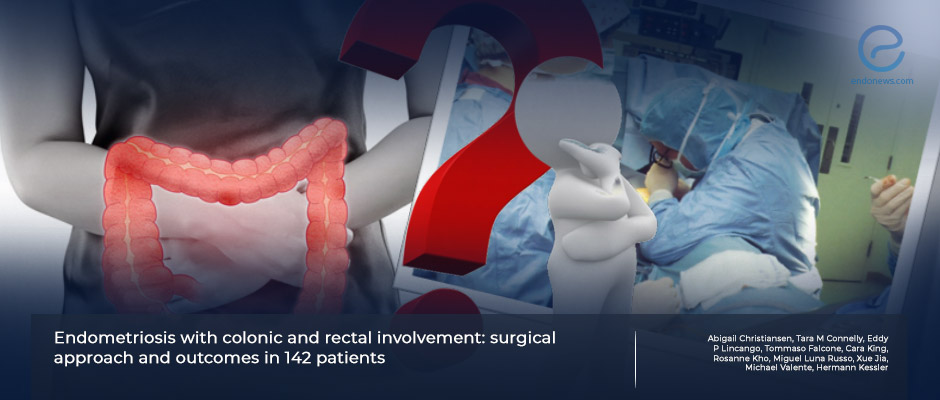The type of surgical approach compared to complications and recurrence for colorectal endometriosis
Nov 24, 2023
A more minimally invasive approach to colorectal endometriosis surgery is associated with fewer complications but higher recurrence rates.
Key Points
Highlights:
- Partial-thickness or full-thickness disc excision compared to bowel resection is associated with a diminished complication rate but increased recurrence risk.
Importance:
- A multidisciplinary approach should be performed to improve surgical outcomes in women with colorectal endometriosis.
What’s done here?
- This retrospective review assesses the impact of different surgical approaches on postoperative complications, symptom improvement, and/or recurrence in patients with colorectal endometriosis.
- The primary outcomes were 30-day complications, recurrence after surgery, and improvement status of symptoms following surgery.
- A variety of surgical procedures including superficial/partial-thickness excision of multiple sites, full-thickness disc excision, bowel segment resection ± appendectomy ± diverting stoma ± any concomitant gynecologic procedure) were analyzed.
- Radiologic, surgical recurrence, and major (anastomotic/bowel leakage, recto-vaginal fistula, bowel obstruction, major infection, thromboembolism, deep/organ space infections, and hemorrhage requiring transfusion) and minor complications (infections, urinary retention, ileus) were evaluated.
Key results:
- A total of 2681 patients who met the eligibility criteria were included, 142 (5.3%) were diagnosed with intestinal involvement requiring surgical resection.
- Minimally invasive techniques were performed in the majority of cases (n=123, 86.6%).
- Superficial partial-thickness excision (n=95, 66.9%), segmental bowel resection (n=39, 27.5%), and full-thickness disc excision (n=2, 1.41%) were applied.
- The most common major complication was deep organ space infection (n=7, 4.9%) and the most common minor complication was urinary retention (n=6, 4.2%).
- There was a significant association between both 30-day minor and major complications and increased intra-operative blood loss.
- No correlation was detected between age or endometriosis stage and symptom resolution.
- Postoperative symptom improvement did not differ between different surgical excision methods regarding superficial partial-thickness excision, full-thickness disc excision, and segmental resection.
- A significant association was also determined between segmental resection and decreased recurrence risk.
Strengths and Limitations:
- The main strength of the study was the inclusion of large, unselected, consecutive cases from a tertiary referral center for endometriosis.
- Being from a single institution and non-randomization of surgical approaches could be accepted as the limitations of the study.
Lay Summary
Women with endometriosis may have extension and infiltration of the intestine, called "colorectal endometriosis, in up to 12%. The main symptoms are alterations in bowel habits, pelvic pain, and/or infertility.
The gold standard management option for colorectal endometriosis is surgical removal of all endometriotic lesions resulting in healthy, disease-free margins. However, the intra- and postoperative complications can be experienced frequently due to dense adhesions and deep pelvic involvement.
Dr. Christiansen et al. from the USA published a systematic review entitled “Endometriosis with colonic and rectal involvement: surgical approach and outcomes in 142 patients” in the journal Langenbeck's Archives of Surgery.
The authors aimed to evaluate the impact of different surgical approaches on postoperative complications, symptom improvement, and/or recurrence in patients with colorectal endometriosis. They determined 30-day complications (both minor and/or major complications), recurrence after surgery, and improvement status of symptoms following surgery as the primary outcomes. Intestinal involvement requiring surgical resection was diagnosed in 142 patients. Superficial partial-thickness excision (n=95, 66.9%), segmental bowel resection (n=39, 27.5%), and full-thickness disc excision (n=2, 1.41%) were applied.
Minor complications were significantly associated with blood loss, sigmoid involvement, stoma formation, and segmental resection while factors significantly associated with major complications were blood loss, open surgery, stoma formation, and segmental colectomy. Symptom improvement after surgery did not differ between different surgical excision methods regarding superficial partial-thickness excision, full-thickness disc excision, and segmental resection. Segmental resection was associated significantly with decreased recurrence risk.
“Limiting resection to partial-thickness excision or full-thickness disc excision compared to bowel resection may improve the risk of complications but can increase the risk of recurrence,” the authors concluded.
Research Source: https://pubmed.ncbi.nlm.nih.gov/37773225/
endometriosis colorectal endometriosis superficial partial-thickness excision full-thickness disc excision segmental resection symptom improvement recurrence

